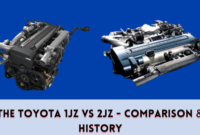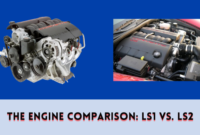The Chevy LS6 Engine Specifications – Issues and Reliability. The small-block 5.7L V8 LS6 was introduced in 2001 and was manufactured until 2005. The LS6 engine was created specifically for the C5 Corvette Z06 and the Cadillac CTS-V. It is the successor to the Chevy LS1 engine and is part of GM’s Gen III small-block engine family. While the LS1 was still in production, it only powered base model Corvettes, while the LS6 was only used in Z06 models.
The LS6 produced 385hp and 385lb-ft of torque for the 2001 model year. The engine was slightly modified in 2002, with a lighter valvetrain and more aggressive cams. Two catalytic converters were also removed to reduce backpressure, and the MAF sensor was redesigned to increase flow to the heads. These minor enhancements increased power to 405hp and 400lb-ft of torque.
While the LS6 was based on the LS1 engine, it received numerous upgrades. The LS6 had a higher-flowing intake manifold and heads, a new PCV system, higher compression, and various small-block changes. These changes enabled the LS6 to produce approximately 55hp more than its predecessor, the LS1.
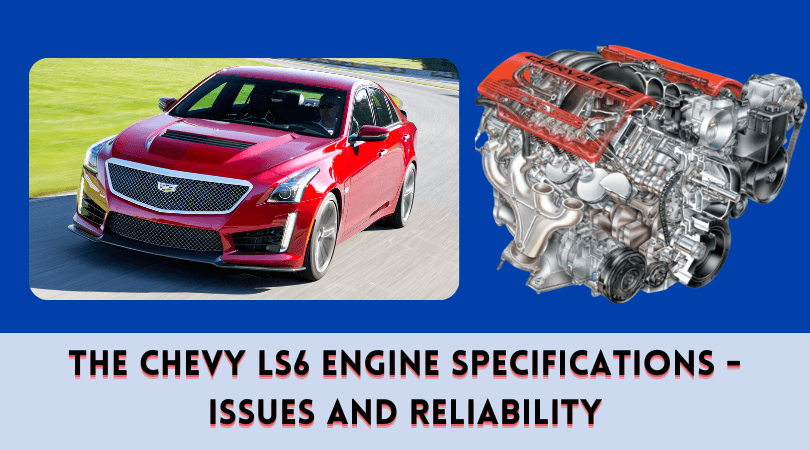
LS6 Specifications
The Chevy LS6 5.7L V8 engine specifications are as follows:
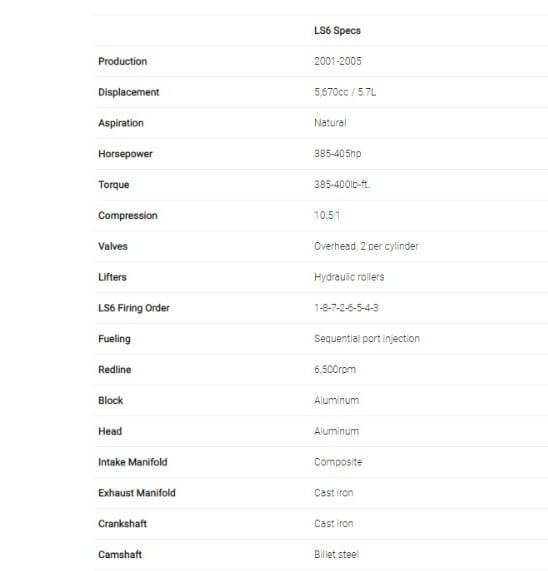
Applications for LS6 Engines
The GM LS6 engine can be found in the following Chevrolet and Cadillac models:
- 385hp / 385lb-ft: 2001 C5 Chevy Corvette Z06.
- C5 Chevy Corvette Z06 (2002-2004): 405hp / 400lb-ft.
- Cadillac CTS-V (2004-2005): 400hp / 395lb-ft.
Common LS6 Issues
Among the most common LS6 engine issues are:
- Excessive use of oil
- Valve Springs Are Broken
- Overheating of the engine
- Failure of a Rocker Arm Bearing
Overall, when left in stock condition, the LS6 is a dependable daily driver. Understandably, the majority of LS6 problems stem from the 2001 model year, as this was a new engine. The majority of the issues with the 2001 models were resolved in the 2002 engine refresh.
There aren’t many problems, or at least none that are catastrophic, with a stock engine. When you start modifying the LS6, such as installing an upgraded intake and using the car for track racing, drag racing, etc., problems usually start to appear. However, these issues are typically mitigated by various additional upgrades such as cooling system improvements such as a larger radiator and oil cooler.
1) LS6 Excessive Oil Consumption Issues
LS6 engines are notorious for their high oil consumption, consuming up to 1 quart of oil every 500 miles. Excess oil consumption is most common in manual transmission cars and those that drive aggressively or at high RPMs frequently. The oil consumption is the result of a design flaw in the PCV system and a valley cover that allows oil to seep into the PCV system.
The LS6 has a unique valley cover that incorporates oil separation baffles and PCV plumbing. Oil enters the PCV system when the PCV baffles are not properly sealed to the valley cover. When this occurs, you will most likely notice some oil leaks beneath your vehicle as well as some minor performance issues.
It is critical to keep your engine topped off with oil if you are experiencing excessive oil consumption. Keep a few quarts of oil in your trunk and top it off as needed to avoid running out of oil and causing catastrophic damage to your internals.
Fix for Excessive Oil Consumption – Z06 & CTS-V
If oil gets into the PCV system, it can be recirculated through the intake manifold, causing an oil buildup behind the throttle body and within the intake manifold. Excessive buildup can restrict airflow or send oil into the combustion chamber, resulting in power losses, misfires, and other problems. If there is oil in the throttle body or intake manifold, the engine valley cover should be replaced. A new set of piston rings must also be installed.
2) Chevy LS6 Valve Springs Broken
The LS6 employs an overhead valve system controlled by pushrods. A tappet, rocker arm, and pushrod open the valves as the crankshaft rotates. A spring on top of the valve uses pressure to close each valve. Each valve has its own spring, and because the LS6 has 16 valves, it also has 16 valve springs.
Valve springs on 2001 LS6s have been known to break. When the valve spring snaps, it no longer has enough tension or pressure to operate the valve properly. It can cause the valve to not fully close or even fall into the cylinder, where it may collide with the piston. Furthermore, the broken spring causes a loss of compression within the cylinder.
Finally, broken valve springs result in significant power losses and performance issues, as well as serious engine damage. If the valve collides with the piston, both of those components, as well as the cylinder head, can be destroyed.
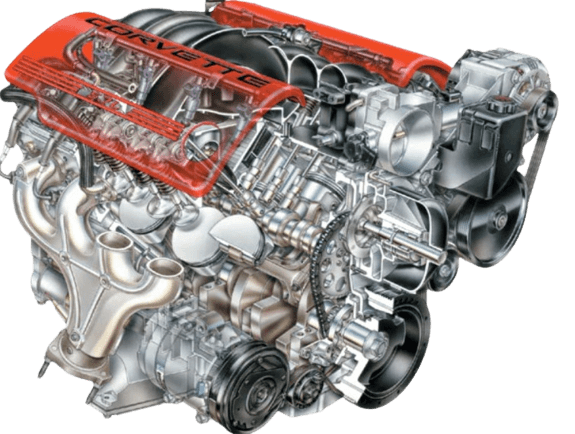
Symptoms of Z06 Valve Spring Failure
The following are some of the most common symptoms of LS6 valve spring problems:
- The engine makes a lot of valve noise.
- Cylinder compression loss
- Idling is very rough.
- Misfires
- Inadequate power and acceleration
- Engine light on (usually for misfires)
3) Overheating Issues with the LS6 Engine
As previously stated, the LS6 is a fantastic engine when left in stock form and driven on the street. When you add more power to the mix and drive it hard, whether on the street or on a track, the stock cooling system becomes problematic. Overheating is most common in Z06s that are tracked or raced, as well as heavily modified street cars.
Heat is produced by power. Racing results in extended periods of high engine temperatures. The LS6’s radiator and oil cooler aren’t designed for either of these conditions, which can lead to overheating if not upgraded. To prevent overheating, common cooling system modifications include installing a larger oil cooler, radiator, or both. While neither of these upgrades will result in more horsepower, they will improve reliability and help keep engine temperatures low, which will have an effect on performance.
Because oil cooler or radiator failure is uncommon on the LS6, stock cars are unaffected. Given how many of these cars are now modded and tracked, I wanted to point out that these two parts are generally insufficient for modded and tracked applications, resulting in overheating and performance decline.
One of the most effective reliability mods is to keep the engine cool.
4) Failure of the LS6 Rocker Arm Bearing
Rocker arm failure was also common in early model LS6s. The overhead valve system includes rocker arms, which are responsible for pushing the valves open. The rocker arms convert the circular movement of the camshaft into linear movement. The cam forces the tappet and pushrod upward, compressing the rocker arm against the valve spring and opening the valve. The rocker arm bearings on the LS6 engine are what cause the rocker arms to stop working properly.
If the rocker arm or bearing fails, the valve’s ability to open and close properly may be compromised. When the arm breaks, the valves are unable to open or fully open, effectively taking out the entire cylinder by preventing air from entering or leaving the cylinder. Valve spring failure can also be caused by broken or worn valve springs.
Related : The Three Common Subaru EZ36 3.6 Engine Issues
Symptoms of Z06 Rocker Arm Failure
The following are symptoms of LS6 Z06 rocket arm issues:
- Idling in a rough manner
- Misfires in the cylinders
- The engine makes a tapping or clicking noise.
- Lack of power and acceleration
- Engine light on (misfires)
- LS6 Dependability
Overall, the LS6 engine is extremely dependable. With the exception of some 2001 model years, the LS6 engine has very few problems, none of which are potentially catastrophic. The majority of rocker arm and valve spring failures are limited to 2001 models. Aside from these two issues, the 2001 engines were extremely dependable.
The block, pistons, valves, heads, and so on are all very strong and can withstand a significant amount of power before needing to be upgraded. The LS6’s cooling system is a weak point that will need to be improved for track and high horsepower applications. Aside from that, the LS6 is capable of exceeding 200,000 miles when stock and properly maintained.
Because the LS6 is based on the LS1 engine, it avoids many of the LS1 engine’s flaws. As a result, the LS6 is thought to be more reliable and less expensive to maintain than the LS6. However, keep in mind that these engines are now well over 20 years old. As these engines age, more and more maintenance issues will arise. Water pumps, hoses, belts, and other components are all prone to failure as they age and accumulate mileage.





